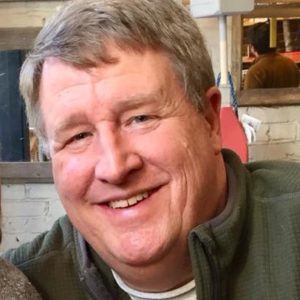A Cooperative Baptist Fellowship church active in resettling refugees in North Carolina’s Research Triangle is mourning the death of its senior pastor diagnosed in February with a brain tumor.

Bill Bigger
Bill Bigger, pastor of Hope Valley Baptist Church in Durham, North Carolina, since 2012, died May 1 in hospice care.
According to his CaringBridge page, Bigger’s wife, Leigh, first noticed he was uncharacteristically forgetting details earlier this year. After feeling embarrassed about losing his place in the order of a Sunday morning worship service, he went to an urgent care medical facility in mid-February.
After a CT scan and MRI, doctors diagnosed a brain tumor. Despite surgery, 15 rounds of radiation and 19 rounds of chemotherapy, a later test revealed the mass had not stopped growing. His doctor said there was little likelihood of extending the pastor’s life in any meaningful way and suggested he focus on quality of life in hospice care.
While his medical crisis advanced rapidly, Bigger lived to celebrate the birth of a grandson on April 10.
A graduate of Southern Baptist Theological Seminary with a D.Min. from McAfee School of Theology, Bigger led Hope Valley Baptist Church in 2016 to support Hope House, a collaboration of local churches, World Relief Durham and Cooperative Baptist Fellowship of North Carolina to provide a temporary home for refugees being resettled in Durham.
Guided by Marc and Kim Wyatt, CBF advocates for internationals ministry, and modeled after Welcome House Raleigh opened in October 2015, Hope House was formally dedicated in March 2017. Bigger’s leadership in establishing the ministry was featured in June 2017 in an article by the United Nations High Commissioner for Refugees.
“It is my faith in God that shapes a commitment to refugees,” Bigger said in the UNHCR video accompanying the article.
Bigger said in the video that like many congregations in the South, Hope Valley Baptist Church has members with political leanings from far-right Republican to far-left Democrat, and when plans got underway to convert a brick ranch house on church property to a shelter he heard from those concerned about whether the refugees staying there could pose a danger.
“I certainly don’t want to do anything to endanger my life, my community, my church,” he said. “We had about a four- or five-month discussion and discernment and even prayer process. I preached several times about what I see as the biblical call to welcome the stranger and to be a neighbor to people no matter their backgrounds.”
“Providing folks with information, helping answer questions about the vetting process, helped some folks to change their minds,” Bigger said. “We ended up taking a church vote, and 84 percent of the church approved moving forward with the project.”
Marc Wyatt, a CBF global missions field worker since 1996 who previously served in Thailand and Canada, said on Facebook that Bigger was one of the first to welcome the couple to the Triangle in 2014.
“He leaves a legacy of ministry toward refugees and immigrants that his church and friends gratefully continue,” Wyatt said.
Visitation is scheduled 5-8 p.m. Saturday, May 4, at Hope Valley Baptist Church. A memorial service also at the church is planned for 4 p.m. Sunday. Plans for an additional memorial service in Charlotte will be announced later.
In the UNHCR video, Bigger said one of the questions asked during the church’s discernment process was “Shouldn’t we be caring for our own instead of these foreigners?”
“I believe we are called to care for ‘both-and,’” the pastor said. “It’s not an ‘either-or’ but a ‘both-and.’”
